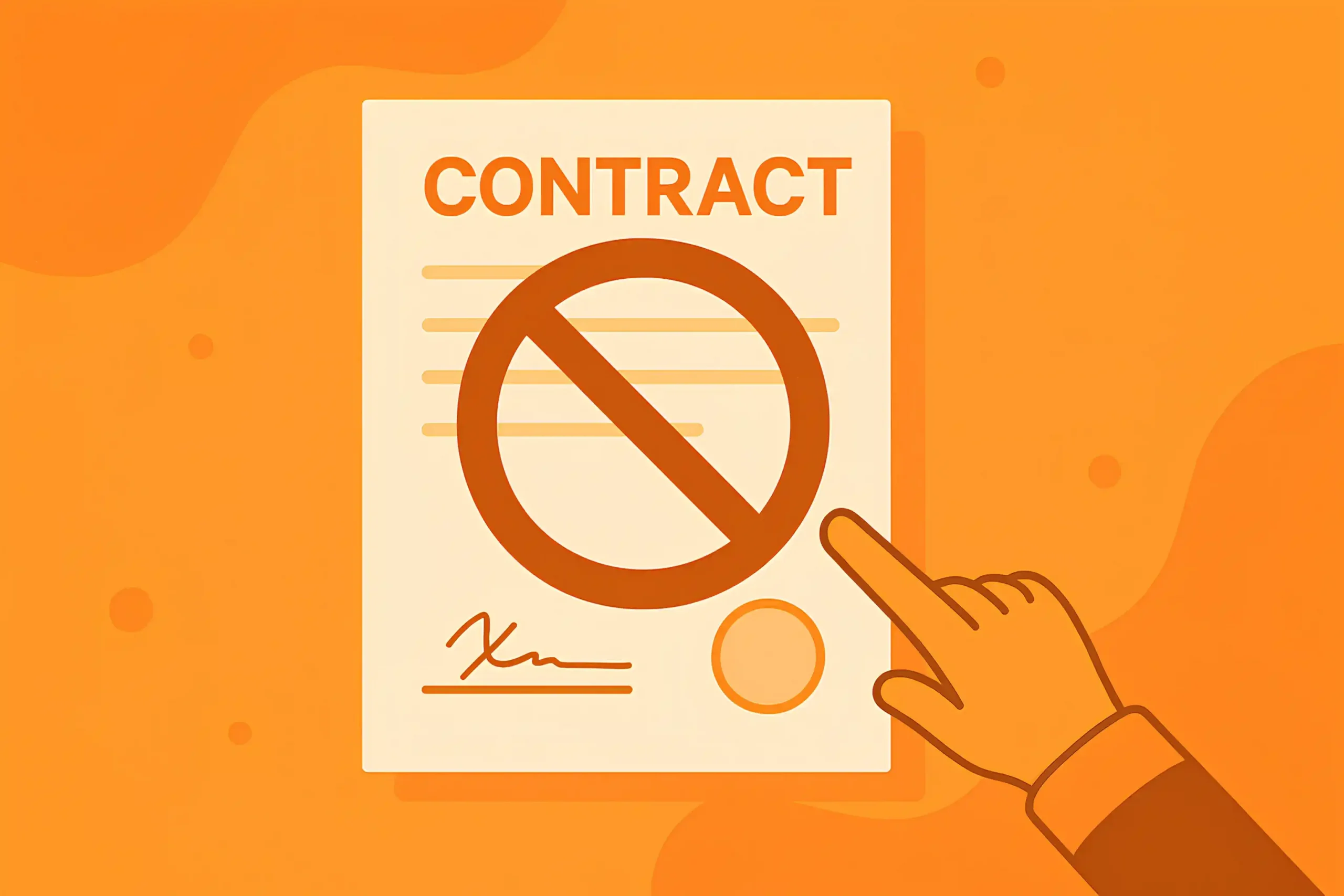Updated January 11, 2026
SEO In-House vs. Outsourcing: Which Is Best for Your Business in 2026?
Hiring an in-house SEO team or outsourcing the work is one of the first big decisions businesses face when they get serious about organic growth. Most of the time, it gets complicated, especially if you’re not familiar with the nuances, the pros and cons of each, and the key factors you need to think through.
I’ve worked with businesses that thrived with a full in-house SEO team, and others that wasted months before realizing they needed outside help. There’s no one-size-fits-all answer; the right choice depends on your objectives, resources, timelines, and how SEO fits into your overall marketing strategy.
In this guide, I will help you make that decision with confidence. We’ll compare both options side by side, from cost and communication to speed, expertise, and scalability, so you can decide which model supports your growth.
If you’re stuck deciding whether to hire internally or bring in an external partner, you’re about to find the clarity you need.
What Does In-House SEO Mean?
In-house SEO refers to a company building and managing its internal team to handle all aspects of search engine optimization. Instead of hiring an external agency or freelancer, the business brings SEO operations under its own roof, often integrating SEO efforts closely with marketing, product, and development teams.
A typical in-house SEO team may include roles like an SEO manager to lead strategy, a content strategist to oversee content creation, a technical SEO specialist to handle site health and performance, and sometimes additional support for link-building, analytics, or local SEO.
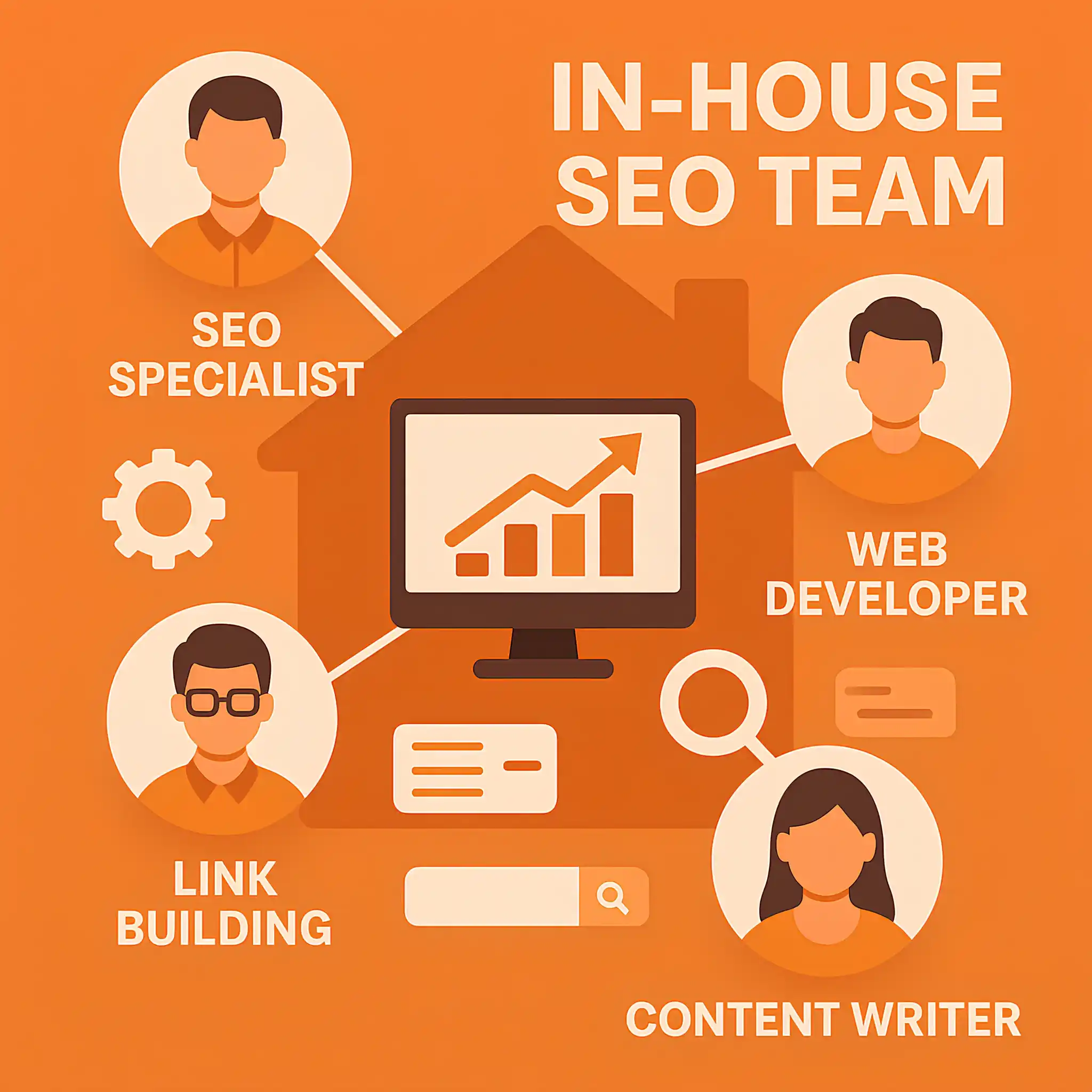
Companies usually go this route when SEO is a core part of their growth strategy, especially if they have the budget to support a full team and need tighter control over brand messaging, workflows, or cross-department collaboration.
It’s most common in large enterprises, high-growth startups, or brands with ongoing content and digital marketing needs to justify long-term investment.
What Does Outsourced SEO Look Like?
Outsourced SEO means hiring external professionals, whether that’s an agency, a freelancer, or a white-label SEO team, to manage all or part of your search engine optimization efforts. Instead of building a team in-house, you’re tapping into outside expertise to execute strategy, fix issues, and drive growth.
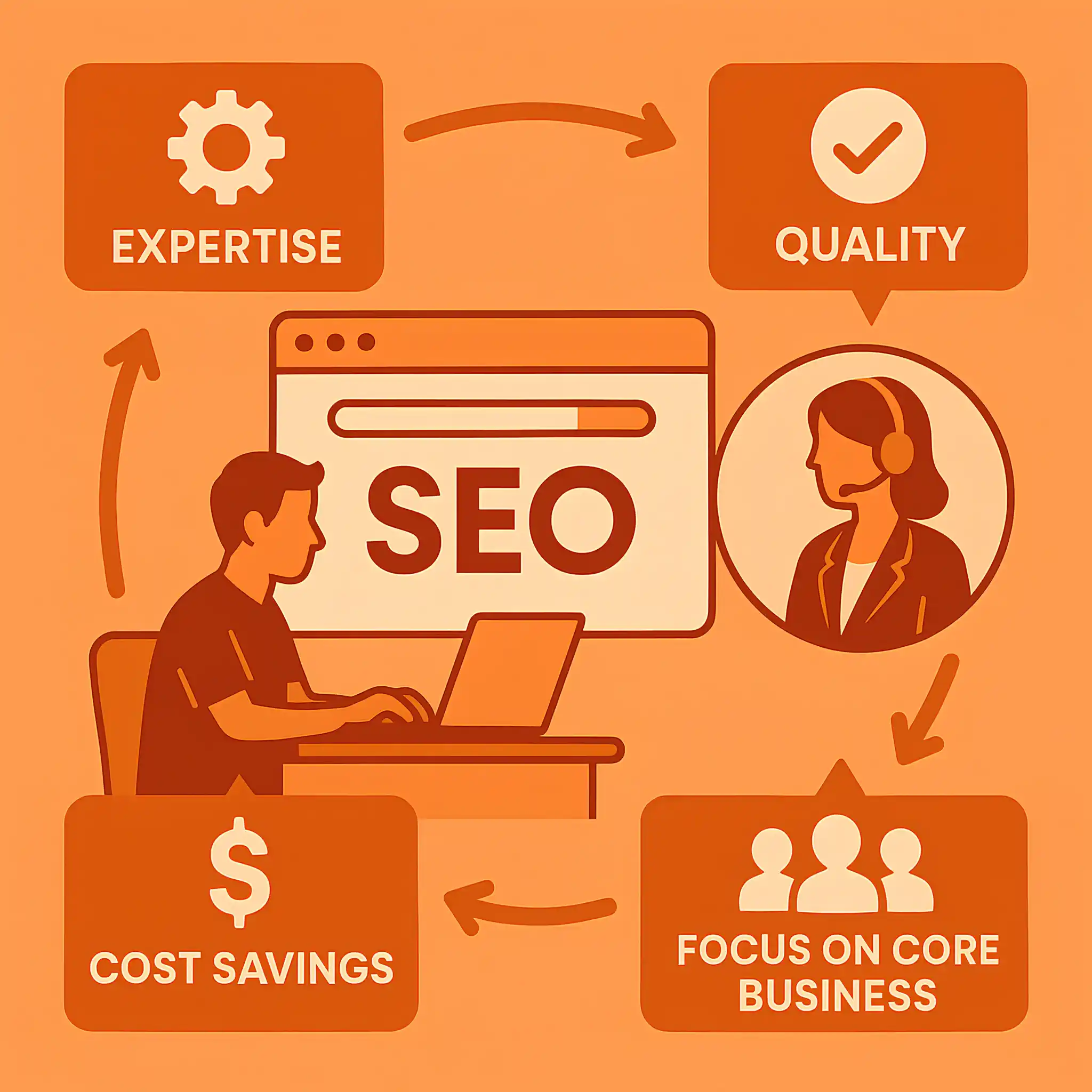
Outsourced SEO services can range from one-off projects like technical audits or content optimization to full-scale ongoing support that includes link building, content creation, keyword research, on-page SEO, and monthly reporting. Some businesses outsource everything; others bring in help for specific tasks they can’t cover internally.
It’s important to note that not all outsourced SEO is created equal. Quality varies widely depending on who they hire, how transparent they are, and how closely they align with your goals. Some providers take a strategic, hands-on approach. Others rely on templates and outdated tactics that can do more harm than good.
Cost Comparison: In-House SEO vs Outsourcing
Before we look at the numbers, keep in mind that SEO cost isn’t just about how much you pay each month; it’s also about what you’re getting for it. In-house teams require salaries, SEO tools, training, and overhead, while outsourcing may come with flat fees, tiered packages, or project-based pricing. Both models have trade-offs in terms of value, scalability, and long-term investment.
| Cost Category | In-House SEO (Estimated) | Outsourced SEO (Estimated) | Notes |
|---|---|---|---|
| Monthly Salary | $4,000–$8,000 per SEO employee | $1,500–$5,000 per month (agency) | Agencies can cost less than one full salary. |
| SEO Tools | $300–$800 per month | Usually included | Most agencies already pay for premium tools. |
| Training and Courses | $200–$500 per employee per year | Included or minimal | Agencies train their own teams at no client cost. |
| Content Creation | $2500-$5000 per employee | Often included or add-on | Some agencies bundle SEO content, some charge extra. |
| Link Building | Separate budget ($2,000–$10,000/month) | Included or quoted separately | Link-building can heavily inflate in-house costs. |
| Total Monthly Cost | $7,000–$15,000+ | $1,500–$7,000 | Outsourcing is often 2–3x cheaper for same output. |
Skills, Expertise & Scalability
I spent years doing SEO full-time inside an agency, working in-house with businesses that expected one person to handle everything: audits, content, technical fixes, reporting, and strategy.
I would say you become a jack of all trades but hit a ceiling fast. It’s nearly impossible to go deep on any one area when you’re managing dozens of tasks across the board.

Thankfully, today, more SEO agencies, including mine, have started structuring teams more strategically. Now we have dedicated departments: a link-building team that focuses only on outreach and placements, a content team that handles research and briefs, and technical experts who don’t touch anything else.
Now, as the founder of a boutique SEO agency, I see the other side clearly. When clients outsource SEO, they’re often getting immediate access to specialists who live and breathe one thing, whether it’s SaaS link-building, technical SEO for eCommerce, or content architecture for B2B sites.
In this case, we bring in people based on needs and specific experience. There’s no waiting for someone to “figure it out”. I’ve worked with brands that spent months training internal hires on basics that we already had playbooks for.
Who Scales Better When You Need to Grow Fast?
Right now, I’m building my in-house SEO team inside Digital World Institute. I’ll be honest, scaling internally is slow. Hiring takes time, onboarding slows progress, and finding talent that’s skilled and reliable isn’t easy.
Compared to our agency operations, we can double a client’s content output, increase link-building velocity, or roll out a full technical cleanup without needing to pause or restructure. That flexibility doesn’t come from luck; it comes from systems we’ve built over the last years and talent we already have access to.
Control, Flexibility, & Communication
When I was working in-house, one of the biggest advantages was how deeply SEO could integrate with other departments. Sitting just a few desks away from the dev team or content manager meant fixes happened faster, alignment was tighter, and SEO wasn’t treated like an afterthought.
I think in this case, in-house teams have the benefit of visibility; you can check in at any time, review progress, and adjust priorities whenever you need. But managing an internal SEO team also means taking on the responsibility of oversight, performance reviews, and continuous direction.
On the other hand, with a good agency, you get structured reports, timelines, and insights without having to micromanage. But not every agency works like that, which is why you must be careful when hiring an SEO agency.
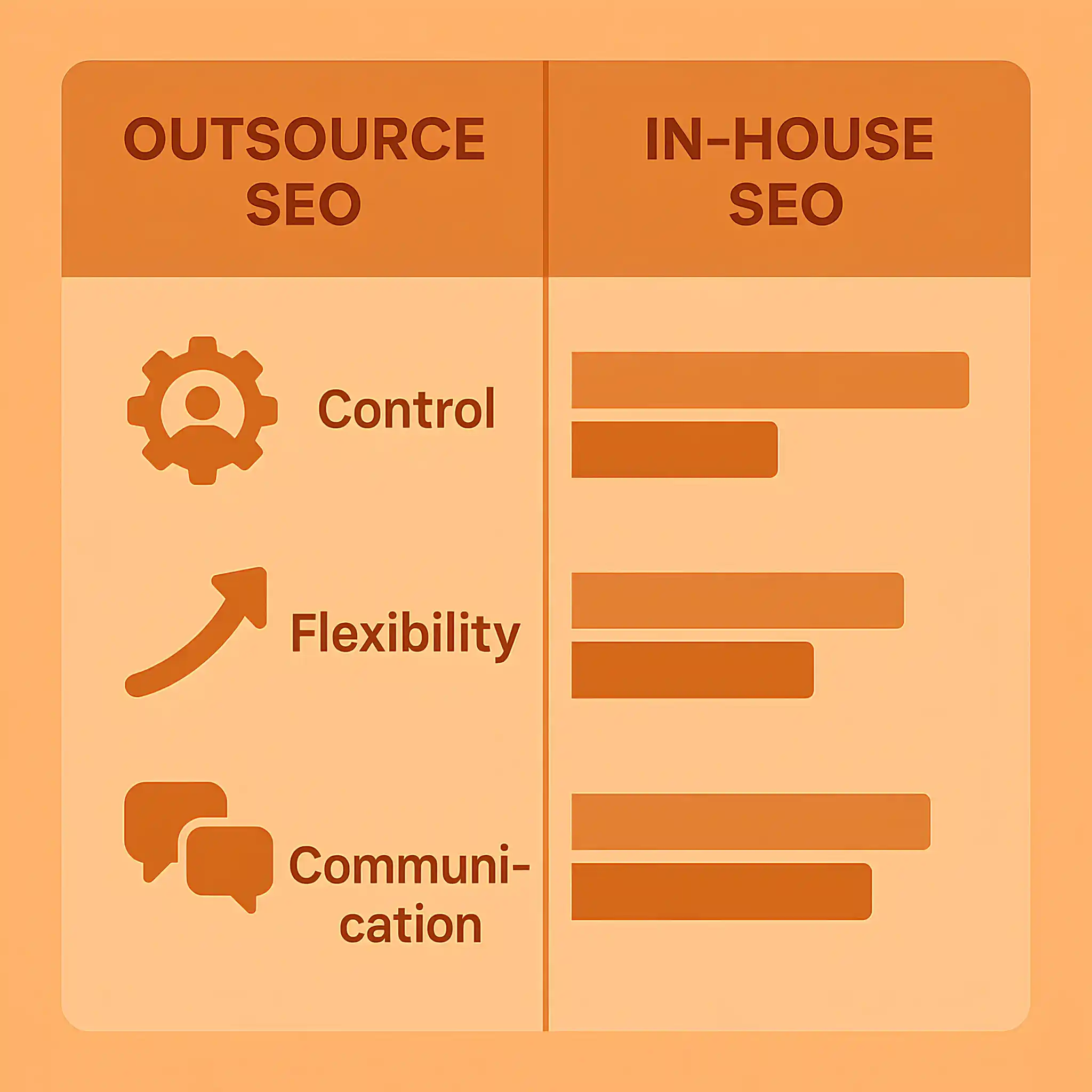
Yes, outsourcing gives you strategic control, but it depends on who you’re outsourcing to. Many companies lose control when working with low-tier providers that run on templates, not strategy. Communication gaps, unclear expectations, and systems can make you feel like SEO is happening to your business instead of for it.
Speed of Execution
In theory, in-house teams should move fast because you have direct access to content writers, developers, and designers under one roof. However, in practice, everything is not as easy as it seems at first glance. The biggest issue is the disconnect between strategy and execution. You may know exactly what needs to be done, but that doesn’t mean it gets implemented right away.
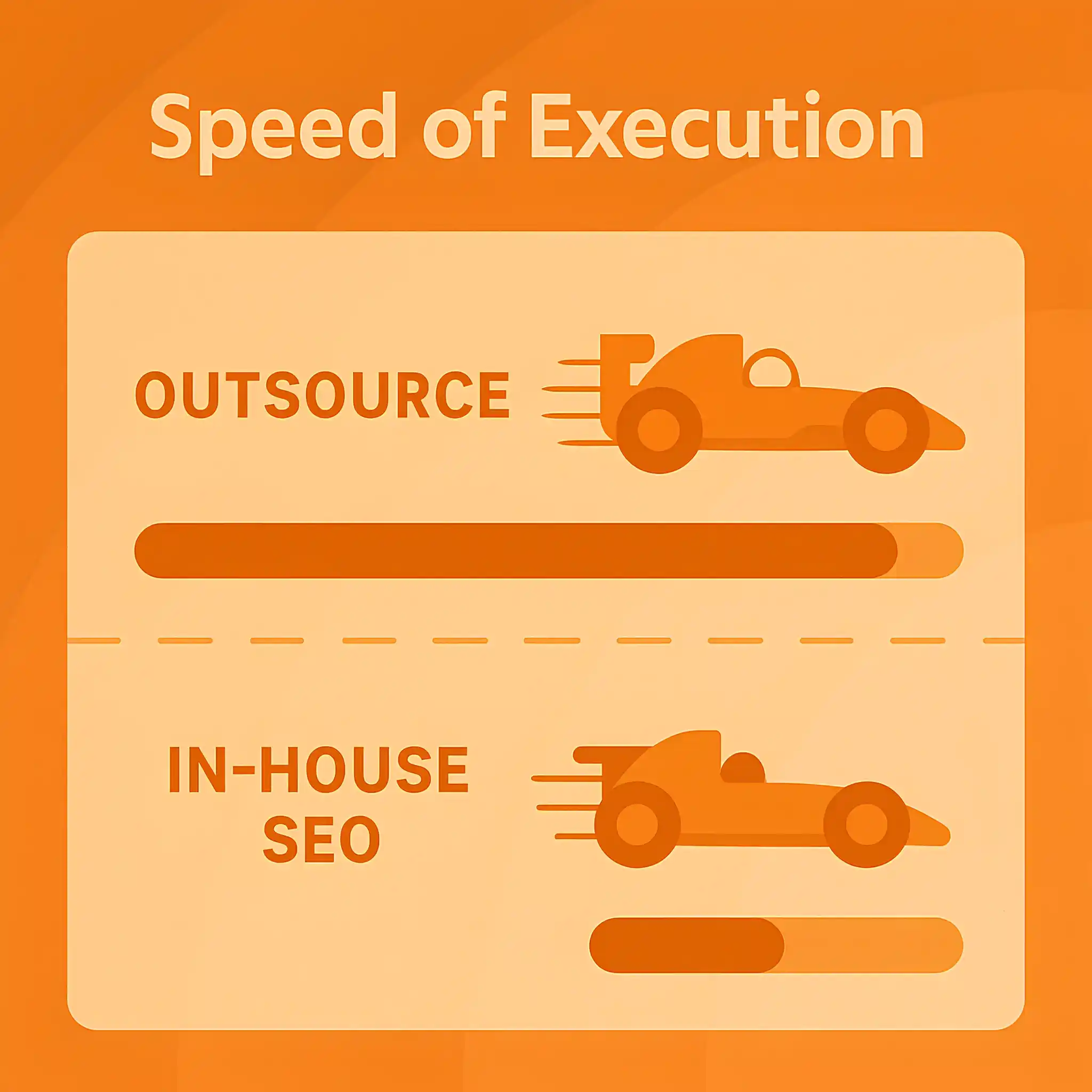
There are many reasons. For example, dev teams are tied up with higher-priority tickets, or design requests sit in a queue. So while you may have full visibility and control, your execution depends on internal communication, and that’s usually shared across multiple departments.
Outsourcing, on the other hand, can speed things up, especially when you work with a focused team that’s already set up to execute.
But again, it’s very important to find the right partner. If you hire a generic SEO provider or buy an SEO retainer package without clear deliverables, you risk slow turnaround, templated output, and little strategic direction.
Building SEO Knowledge Internally
One of the biggest advantages of running SEO in-house is the opportunity to build long-term knowledge inside your company. When your team handles strategy, content, and technical implementation themselves, they learn how SEO works in your unique industry, not in theory, but in practice.
Over time, they get better at identifying patterns, spotting issues early, and making smarter, data-driven decisions.
Teams develop playbooks, workflows, and processes that aren’t just based on best practices but on your business. In some cases, even if team members leave, much of that learning can stay within the company through documentation, cross-functional alignment, and shared tools.
Risks of Over-Reliance on External Teams
At the same time, outsourcing everything can create a dangerous knowledge gap. If your entire SEO operation lives in someone else’s system: their dashboards, their processes, their hands, what happens if the contract ends or the SEO agency changes direction?
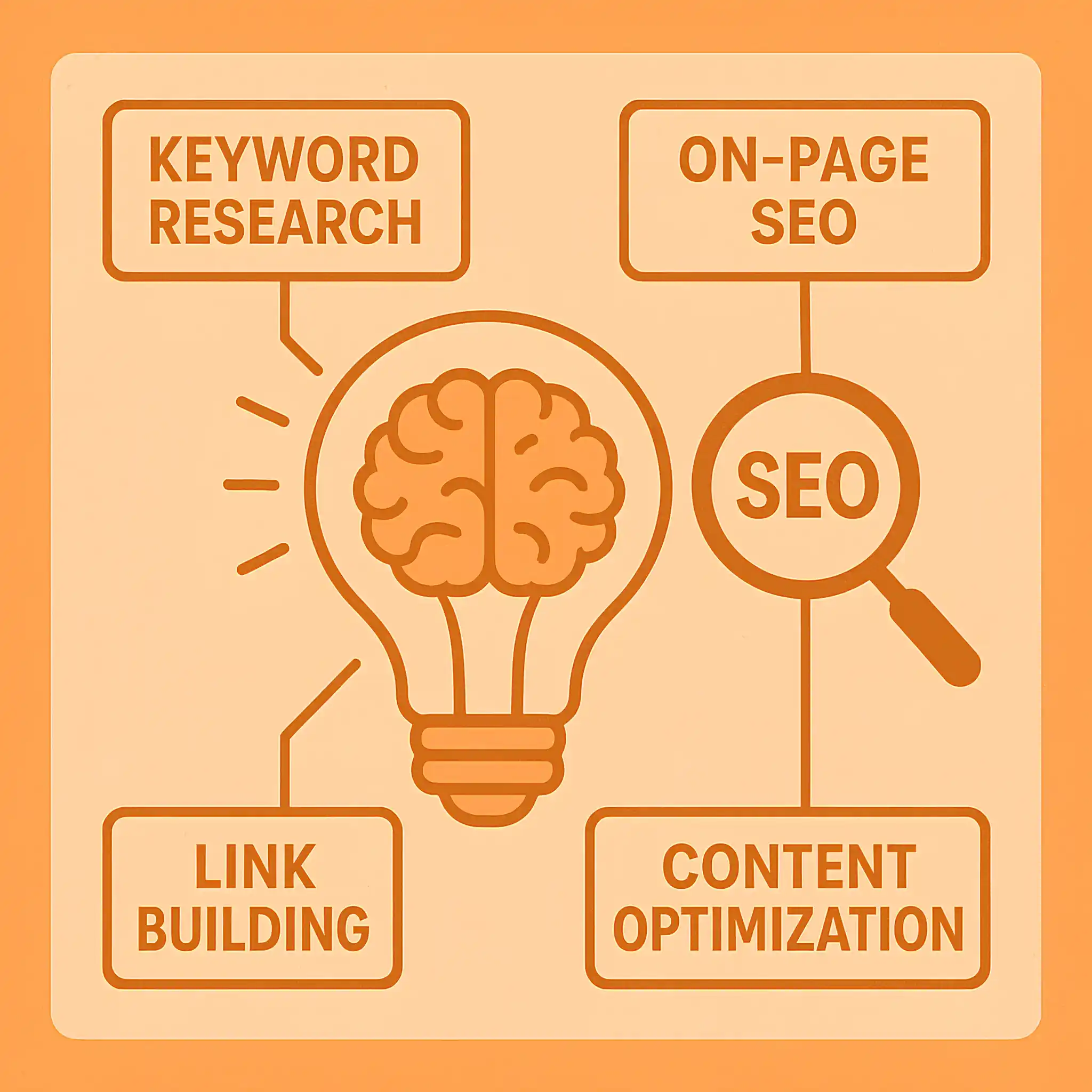
In such cases, many companies completely lose progress after cutting ties with an outsourced provider, simply because no one internally knew how to continue the work. When you outsource without building any internal understanding, you’re putting your long-term growth at risk.
To avoid that, some companies bring in an SEO coach to help guide the internal team while still benefiting from external execution.
When to Choose In-House SEO
I would say in-house SEO works best for businesses where search is not just a channel, but a core pillar of their long-term growth. Enterprise brands, media companies, and large marketplaces often reach a point where SEO needs to be integrated into daily operations, not outsourced to an external partner with limited visibility.
They also need SEO alignment across departments, from dev and product to PR and legal, something that’s easier to manage when your SEO team is embedded within the organization.
Media sites, for example, often depend on breaking news and evergreen content strategies that evolve daily. Relying on an external partner for real-time adjustments or collaboration with editors just doesn’t scale.
A strong signal is when your SEO needs are ongoing and high-volume: constant technical fixes, large-scale content production, link acquisition, international targeting, or local SEO at scale.
At this point, working with external teams may feel like you’re constantly re-explaining your priorities or fighting for attention.
When to Choose SEO Outsourcing
Maybe I’m wrong but outsourcing SEO is often the smartest move for businesses that need results but aren’t ready or equipped to build an internal team. Startups, SaaS companies, and fast-growing B2B brands benefit the most because they often need speed, specialization, and flexibility without the challenge of hiring, onboarding, and managing full-time talent.
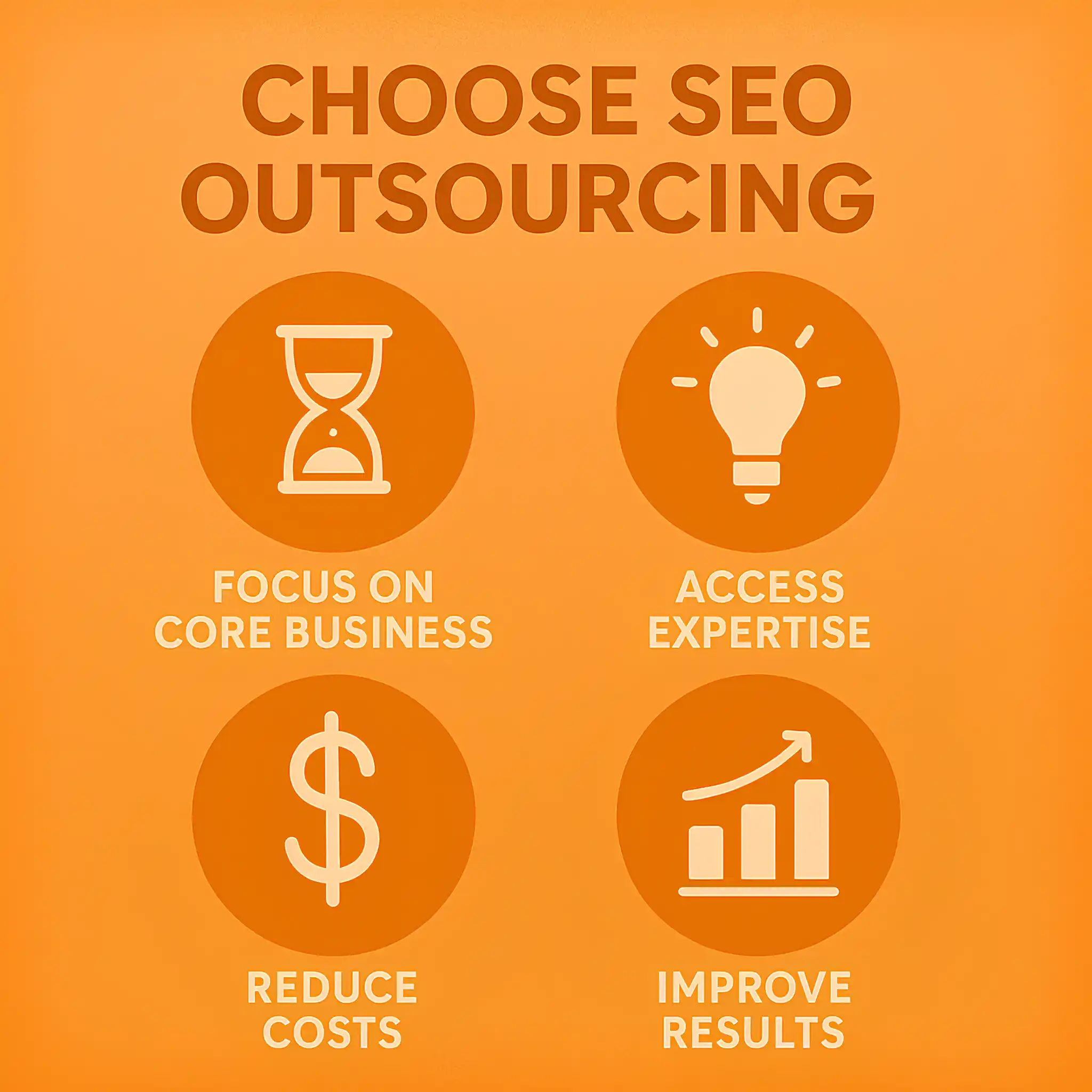
I’ve worked with SaaS companies, for example, that had strong products but zero organic visibility. Instead of spending six months recruiting in-house, they outsourced to a small, focused team (ours) and started seeing progress within months.
For businesses testing SEO before fully committing, outsourcing lets you validate the channel without locking into long-term payroll costs. Whether it’s a technical audit, content roadmap, or PR link-building campaign, you can scale effort without scaling overhead.
If you’re working with a tight marketing budget, building an in-house SEO team can stretch resources thin, especially when you factor in salaries, tools, training, and time to get started.
Personal Opinions from Industry Experts on In-House SEO Difficulties
Multiple experts emphasize that one of the biggest obstacles is getting buy-in from peers and especially from the C-suite. Without their support, even the best strategies stall.
As one in-house SEO professional put it
He continues, relationships and soft skills are arguably more important than your SEO skills. If you can’t convince people why things need to be done, then they won’t get done.
Even when there is buy-in, getting sufficient budget and manpower is a recurring challenge. In-house SEOs often have to “be ruthless when it comes to your spend,” and are frequently forced to focus on quick wins just to justify further investment.
Another expert adds
I came across a great insight on Quora
The Bottom Line
In-house SEO works best when you have a long-term vision, existing team infrastructure, and the patience to build. It’s slower to start but more deeply aligned with the brand.
Outsourcing, on the other hand, delivers speed and systems, especially when you need traction now and don’t have the time or expertise in-house. But it only works if you treat it like a partnership, not a quick fix.
When Does It Make Sense to Switch From an Agency to In-House?
I believe the right time to switch is when SEO stops being just a marketing strategy and starts becoming part of how your business works. If you’re constantly needing SEO input during product planning, campaign launches, or weekly marketing meetings, relying on an external agency starts to feel slow, even if they’re doing great work.
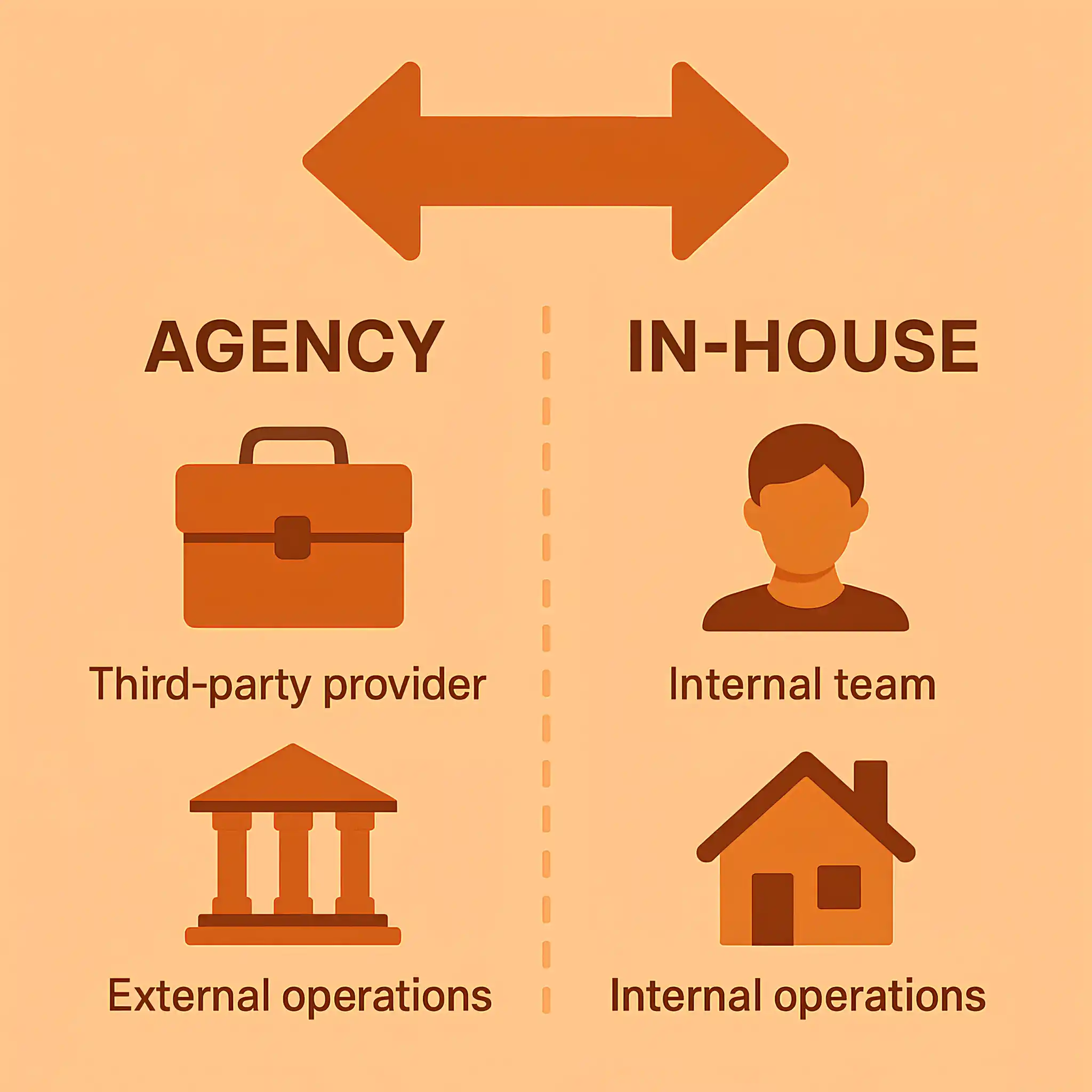
It also makes sense when you’ve outgrown fixed deliverables. If you’re constantly requesting custom strategies, new workflows, or faster turnarounds, it may be time to build the muscle internally, with people who wake up thinking about your brand.
Can I Combine In-House SEO With Agency Support?
Absolutely, and in many cases, it’s the smartest setup. I’ve worked with companies that have internal SEO managers who own the strategy, but rely on agencies for execution, scale, or specialist skills they don’t have in-house. It’s a model that allows for control and speed.
For example, your in-house team might handle content briefs, internal reporting, and roadmap planning, while the agency handles link-building, technical audits, or large-scale content production.
In this case, it’s just very important to keep the communication. Both sides need to know their role, otherwise, you risk overlap or missed opportunities.
What’s the Risk of Hiring the Wrong SEO Agency?
Hiring the wrong SEO agency can cost you far more than just wasted budget. Many businesses are locked into long contracts with agencies that overpromise, underdeliver, and rely on spammy tactics like Private Blog Networks (PBNs) or templated content.
One of the biggest traps is going for “affordable SEO services” without asking why they’re so affordable. In some cases, these agencies can do real damage to your domain reputation or make decisions that aren’t recoverable without serious time and effort.
In this case, you might also want to consider no-contract SEO, which gives you flexibility and protects you from being locked into long agreements. We’ve put together a detailed guide on no-contract SEO that explains how it works and why it may be a safer choice for businesses.
How Do I Know if My Internal Team Is Underperforming?
It’s not always obvious at first. But if you’re not seeing any results after 6–12 months, that’s a red flag. Again, it’s really important to have at least some SEO knowledge to evaluate your in-house efforts. I’ve personally seen so-called professionals point to branded traffic and claim it’s all thanks to SEO.
Curious about how long SEO takes? Here are some great statistics for 2025.
What Roles Are Essential in an In-House SEO Team?
You need an SEO manager or strategist to lead the campaigns, set priorities, and align efforts with business goals. Next, you need a link-building specialist or SEO content strategist, someone who understands search intent, can guide writers, and knows how to structure content for users and search engines.
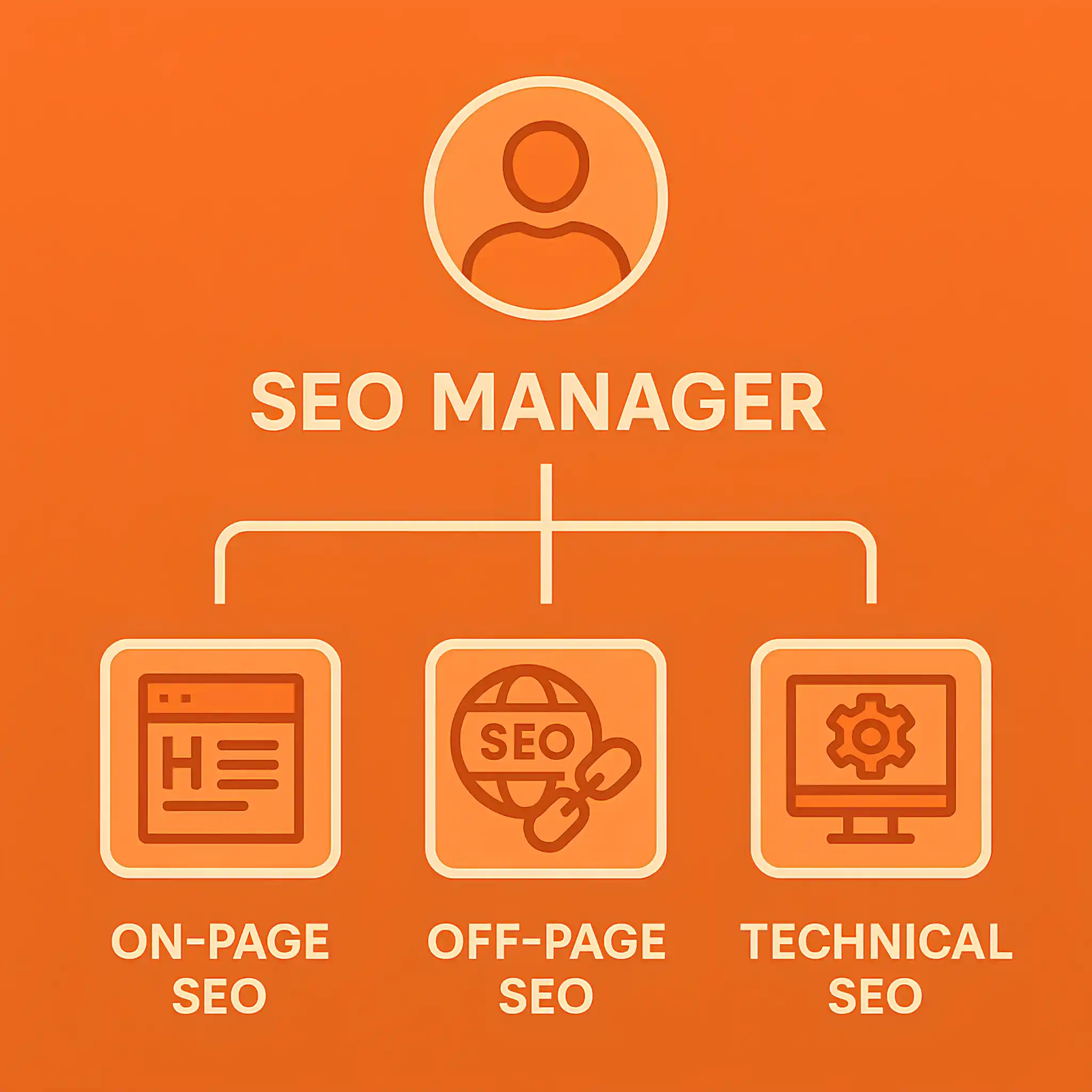
If your site is large or complex, a technical SEO specialist becomes essential. Other valuable roles include a link-building or outreach specialist to grow authority, and an SEO analyst to track performance, test strategies, and help the team stay data-driven.
What’s a Hybrid SEO Team and When Is It Ideal?
A hybrid SEO team is a setup where some roles are handled internally, like strategy, content planning, or reporting, while others are outsourced to an agency or freelancer for execution. This model is ideal for scaling companies that want control without the overhead of a full SEO department.
From my own experience, hybrid setups work best when you have at least one person in-house who understands SEO enough to manage priorities and quality, but don’t yet have the resources to build a full team.
Should I Hire a Consultant Before Building In-House?
Why not? Hiring an SEO consultant before building an in-house team gives you clarity, direction, and avoids costly missteps. A good SEO consultant will help you assess your current SEO needs, identify which roles are essential (and which can wait), and create a roadmap your future team can execute.
In most cases, companies that skip this step often hire too soon, choose the wrong skill sets, or overwhelm a solo SEO hire with unrealistic expectations.
Can I Build an In-House Team Part-Time?
You can, but whether it’s effective is a different story. Building an in-house SEO team part-time might work in the very early stages, especially if you’re testing the channel or have a limited budget.







